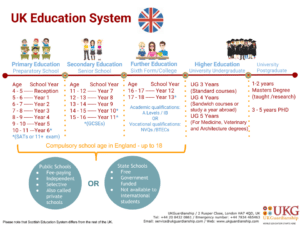Navigating the UK Education System: A Friendly Guide for Parents
The UK Education System Explained (England)
Hello, wonderful parents! If you’ve ever found yourself scratching your head over the UK education system, don’t worry; you’re not alone. Understanding the ins and outs of Key Stages, infant schools, primary schools, secondary schools, and sixth form colleges can seem like deciphering a secret code. Fear not, though – we’re here to break it down for you in a friendly and digestible way. Although there may be exceptions to what follows (e.g. some counties still have Grammar Schools), this is how schools are divided in the majority of UK education authorities.
Key Stages 1-4: The Building Blocks of Learning
Let’s kick things off with Key Stages. These are like the chapters in your child’s education book, and there are four of them: Key Stage 1 (ages 5-7), Key Stage 2 (ages 7-11), Key Stage 3 (ages 11-14), and Key Stage 4/GCSEs (ages 14-16). Each stage has its own set of educational goals and milestones, ensuring your little one gets a well-rounded education.
 Infant Schools: Where the Journey Begins (Reception to Year 1)
Infant Schools: Where the Journey Begins (Reception to Year 1)
Picture this: your child, waving goodbye, stepping into the world of education for the first time. Welcome to infant schools, the start of the adventure! Here, in Key Stage 1, kids dive into the basics of reading, writing, and arithmetic. It’s a time of discovery and play, focused on the building blocks of learning.
Junior Schools: Nurturing the Growing Minds (Year 2-6)
As your little explorer advances to Key Stage 2, they enter the realm of primary schools. These are the places where subjects get a bit more specific, and the excitement of learning truly takes flight. From science experiments to creative writing, primary schools lay the groundwork for a love of learning. Plus, with the support of fantastic teachers, your child begins to uncover their unique strengths and interests.
Primary Schools: (Sometimes Infant and Junior Schools are combined) (Reception to Year 6)
In some areas, children complete Key Stages 1 and 2 in the same school.
 Secondary Schools: Teenagers and Textbooks (Year 7-11)
Secondary Schools: Teenagers and Textbooks (Year 7-11)
Hold onto your hats, parents – secondary school is here! Key Stage 3 introduces a wider range of subjects, allowing your child to explore areas they may not have encountered before. It’s a time of self-discovery, both academically and personally. As they dive into Key Stage 4, those all-important GCSEs come into play. These exams set the stage for future academic endeavours, so buckle up for a few years of hard work and achievements.
Sixth Form Colleges: The Bridge to Adulthood (Year 12-13)
After the whirlwind of Key Stages 1-4, your teenager reaches the crossroads: sixth form colleges. Here, in the magical realm of college, they specialise in a few chosen subjects, which may be vocational or academic, with a wide range of qualifications available, e.g. apprenticeships– A-levels, BTECs, or T-levels. These qualifications can open doors to universities and shape the path for future careers. It’s a time of increased independence and responsibility, where your child transforms from a student to a young adult.
In a nutshell, the UK education system is a journey. It’s the tale of your child’s growth, knowledge expansion, and the blossoming of their unique potential. So, to all the parents out there, fear not! Armed with this friendly guide, you’re ready to be the supportive co-pilot in your child’s educational adventure. Here’s to the exciting chapters ahead!
National Curriculum: Key stages
The National Curriculum was established in 1988, provides a framework for education in England and Wales for students between the ages of 5 and 18. While the National Curriculum is followed by most state schools, some private schools and academies design their own curricula.
| Key Stage | School Year | Age | ||
| Primary Education | 1 | 1 | 5-6 | Primary education begins at age 5 and continues until age 11. At the end of Key Stage 1 (year 2) and Key Stage 2 (year 6), pupils take compulsory SATs (Standard Assessment Tests). |
| 2 | 6-7 | |||
| 2 | 3 | 7-8 | ||
| 4 | 8-9 | |||
| 5 | 9-10 | |||
| 6 | 10-11 | |||
| Secondary Education | 3 | 7 | 11-12 | During Year 9, students choose which subjects to study at Key Stage 4. These will be the subjects they take for their GCSE (General Certificate of Secondary Education) exams at the end of year 11. |
| 8 | 12-13 | |||
| 9 | 13-14 | |||
| 4 | 10 | 14-15 | ||
| 11 | 15-16 | |||
| Further Education | 12 | 16-17 | At the end of students’ secondary education, they can either pursue academic qualifications such as A-Levels or IB in order to go to university, or vocational qualifications such as NVQs and BTECs to prepare them for full time employment. | |
| 13 | 17-18 | |||
| Higher Education | University | 17+ | To find out more details about applying to universities in the UK, please visit University Application. | |


